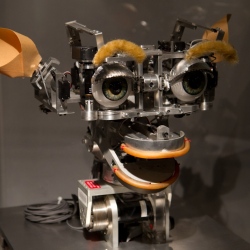
THEY DON’T NECESSARILY look like we thought they would, but the robots are already among us. They give us directions when we’re driving. By 2015, Governor Deval Patrick recently announced, they will collect all tolls in Massachusetts.
Apple’s personal assistant, Siri, might as well be an early prototype for protocol droids like C-3PO of “Star Wars.” The drones America’s sending into battle could be precursors to the robot army that rises up against humankind.
As robots get smarter and more competent, will we benefit? Robot wars aside, economists, at least, have assumed the answer is yes. The less menial work humans need to do, the more we can focus on the creative and flexible work that humans excel at—jobs that involve talking, listening, selling, inventing, choosing, designing. Most textbook economic models economists learn in school assume that when new-fangled machines drive growth, everyone ultimately benefits.
But a number of economists have noticed that today’s technological changes are affecting workers differently than those models would predict. To the extent that the economy has rebounded, it has added fewer jobs than in past recoveries, as businesses take the opportunity to replace more people with machines.
Some experts, like Jeremy Rifkin at the Foundation on Economic Trends, have gone so far as to predict that we’ll soon be living in a workerless world. But certain people are going to lose their jobs before others—and economists are beginning to take a hard look at the workers for whom robots may be a more immediate menace. Edward Leamer, an economist who teaches at the UCLA Anderson School of Management, has argued that while information technology is creating opportunity for the most talented workers, it’s exacerbating income inequality by reducing the skills needed to perform most jobs. And now a disturbing new study by two researchers at Boston University and Columbia University is suggesting that fast-moving automation may come at the expense of another group of victims: our kids.
